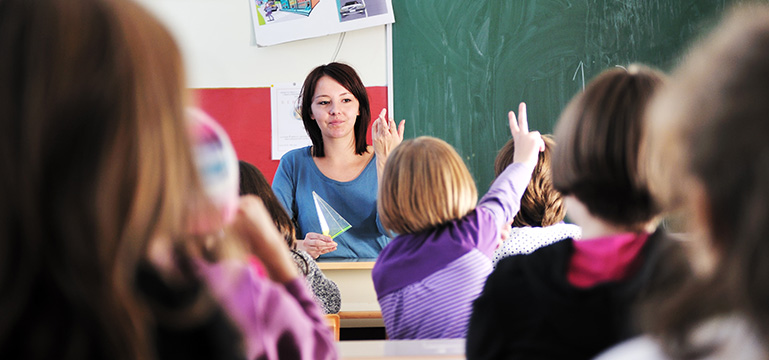An inclusive and nurturing environment for all children

Context
Cwm Glâs Primary School is in the village of Winch Wen in the City and County of Swansea. There are 294 pupils aged 3 to 11 years on roll, including 38 part-time pupils in the nursery. Very few pupils with mild to moderate learning difficulties attend the special teaching facility on the school site.
Around 32% of pupils are eligible for free school meals. This is well above the average for Wales. The school identifies 54% of pupils as having additional learning needs, which is higher than the national average. A very few pupils have a statement of special educational needs, with a majority educated in the special teaching facility. A very few pupils have English as an additional language, whilst no pupils speak Welsh at home. The current headteacher took up his post in September 2017.
Culture and ethos
Cwm Glâs Primary School lies at the heart of its community, offering a positive and inclusive ethos that welcomes all pupils, whatever their background or circumstances. Staff at all levels celebrate achievement and champion success. Leaders ensure that the pupils have a memorable, relevant and balanced learning experience at Cwm Glâs. The school notes that it has a relentless aim for pupils to leave Cwm Glâs as confident, resilient, ambitious and capable learners, ready to take their place in the world. The school provides a happy, family environment where pupils grow in learning and in life. The school is proud of its inclusive and nurturing ethos and it promotes pupils’ rights as a main principle that underpins all of its work.
Action
The school invested in an effective nurture provision in January 2013 and this has grown to support many identified learners. All staff refer pupils into the provision using an in-house system and standardised tests. The school has worked effectively to develop its practice, seeking training and network links with other settings. Further investment in the nurture provision has seen it flourish into a centre of best practice, now offering support to other settings and hosting nurture training events. This is having a profound impact on the self-esteem and self-confidence of some of the school’s most vulnerable pupils. Recently, the school has become affiliated with ‘Team Around the Family in Schools’ to strengthen the impact further. The school works with an effective multi-agency approach, developing strong, nurturing and trusting relationships with parents, ‘nans’, carers and families. Each Monday, classes host 'check-ins' after the weekend to explore pupils’ feelings. Pupils can be referred to the Pastoral Support Assistant for emotional support where needed. The school hosts regular learning café events, focusing on reading or maths. As a result, the percentage of pupils with reading scores equal to or higher than their chronological reading ages have increased from 18% to 52%. The pupils are the true hosts at these events, with pupil voice groups chaperoning, demonstrating and enthusing other pupils, whilst empowering parents and carers to support learning at home.
Family learning sessions are strategically targeted towards reception pupils’ parents and carers, to strengthen home-school relationships from the outset and to offer early strategies for supporting and valuing learning at home.
The inclusive ethos is a key area of strength. Rigorous tracking of each individual learner ensures that all achievements are valued and secures accountability for outcomes. School leaders are prepared to support and work alongside families and agencies to secure the very best for every child, whilst engendering a positive attitude to learning. Provision for pupils who require additional support is very strong and the additional learning needs co-ordinator supports teachers and support staff effectively in tailoring high quality provision. Well-trained staff deliver a range of beneficial intervention programmes and support to improve pupils’ literacy and numeracy skills as well as their emotional and wellbeing needs. All pupils with additional learning needs contribute well to their own specific and measurable individual education plans, which they complete alongside key staff and parents or carers. As a result of this high quality provision, nearly all targeted pupils make good progress at least in line with their abilities and needs.
Another strength of the way the school facilitates pupil voice is through groups such as the school council, healthy schools group and the eco Schools group, which are all involved in strategic school planning. They help to determine the school development plan priorities, offer challenge to school leaders and cascade information back to their peers and parents. Pupils contribute to policy writing, ensuring that their voice and opinions are heard. ‘Digital Leaders’ create and share important messages about online safety and host seminars for parents and carers. All Year 6 pupils are given a role of responsibility, engendering pride and confidence and strengthening staff and pupil trust.
Outcomes
All pupils develop into resourceful, reciprocal, reflective and resilient learners. Attendance has placed the school consistently in the top 25% when compared to similar schools for a number of years. Parents, carers, children and families feel supported by the school. Standards of progress show an upward three-year trend, with the performance gap between boys and girls significantly reduced. Likewise, trends for learner groups demonstrate the positive impact of the school's inclusive and nurturing approach. The school has achieved the highest accolade regarding its commitment to being a healthy school.